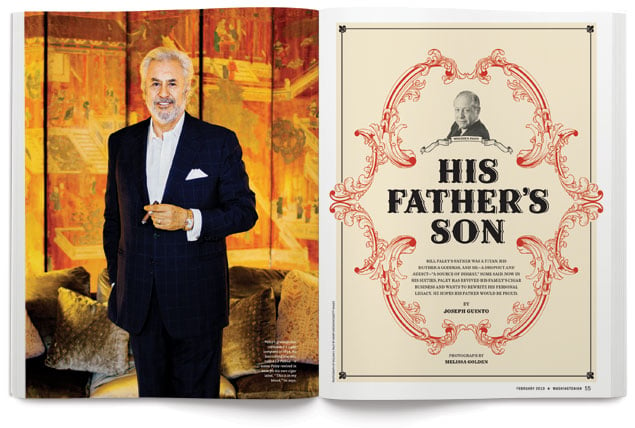In any of the homes where Bill Paley grew up—the 85-acre estate
in Manhasset, Long Island; the pied-à-terre at the St. Regis hotel in
Manhattan; the 20-room duplex with lacquered, taxicab-yellow walls on
Fifth Avenue; or the retreat in the Bahamas called Lightbourne House—you
would have found original works by famous artists on the walls. Maybe a
van Gogh or a Gauguin in the living room. A Matisse in the parlor. Even a
Picasso—a seven-foot-high Picasso, “Boy Leading a Horse,” from the
artist’s Rose Period—in, of all places, the entry hall.
As a kid, Paley couldn’t have told you much about the
masterpieces. “I didn’t realize what we had until I was older and started
going to museums,” says Paley, whose father, William, became a millionaire
at age 26 and had amassed a half-billion-dollar fortune by the time of his
death in 1990. “I’d be looking at a Rousseau and I’d say, ‘Hey, Dad has
one of those over the fireplace.’ ”
Stars of stage, screen, radio, and print were regularly feted
at the Paleys’ residences, none more regularly than Truman Capote. For two
decades, the author of Breakfast at Tiffany’s was a confidant of
Paley’s mother, Barbara Cushing Mortimer Paley—Babe for short. A socialite
and fashion editor at Vogue, Babe Paley was lauded for her
interior-design sense and personal style and was inducted into the
International Best Dressed List Hall of Fame in 1958 along with Hollywood
stars Claudette Colbert and Irene Dunne and Britain’s Queen Elizabeth II.
Capote once wrote of Babe, “Mrs. P. had only one fault: She was perfect;
otherwise, she was perfect.”
Even as a kid, Bill Paley could have told you that. “My mother
had amazing grace and amazing taste,” he says.
Paley, now 64, sits in a tobacco-brown leather chair in the
fern-green parlor of a Dupont Circle rowhouse he has owned and used as an
office since 1993. “All boys see their mother as a goddess,” he says. “But
when I looked around and saw that everyone else thought my mother was a
goddess, too—well, I really came to believe it was true.”
He pauses. There’s a “but” coming, a telling clarification:
“But she wasn’t the warmest person in the world. She had her own intimacy
issues, much like my father.”
• • •
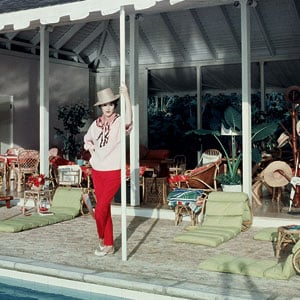
If Babe was a goddess, Bill’s father, William S. Paley, was a
titan. In 1927, he cashed in his shares of his family’s booming cigar
business and bought a struggling network of radio stations known as the
Columbia Broadcasting System. By the time he left that network in 1983,
Paley had built it into a multibillion-dollar media corporation. CBS. The
Tiffany Network. In 1976, the New York Times wrote that William
Paley was to American broadcasting “as Carnegie was to steel, Ford to
automobiles, Luce to publishing, and Ruth to baseball. None has yet been
succeeded in kind.”
None. Certainly Bill Paley, William and Babe’s only son
together, hasn’t succeeded his father’s accomplishments. Little Bill, as
they once called him, could have followed his father into CBS’s executive
ranks. He could conceivably have run the network that remained in William
Paley’s control for decades. A twentysomething Bill Paley—at a
camera-ready six-foot-two, with midnight-black hair and what was once
described as a “toothpaste-ad smile”—might also have taken an on-air role
at the network. But he refused to be a part of CBS.
Instead, he grew his hair long, donned an earring that enraged
his father, bought a boat, and sailed the Florida Keys. He sometimes spent
weeks alone in the middle of the Everglades. He was, he says, “a hermit.”
He was also an addict. He picked up an amphetamine habit in Spain, heroin
in Vietnam, and plenty of marijuana in Northeast DC, where he ran a bar
called the Gandy Dancer.
When Bill Paley turned 27, the same age at which his father
took over CBS, he was described in print not as a titan but as “a hippie
and a dropout.” In the book CBS: Reflections in a Bloodshot Eye,
author Robert Metz also said Paley had been “a source of dismay” to his
father.
Thirty-eight years have passed since those words were written.
Long enough for both Babe, in 1978, and William, in 1990, to have passed
on. Long enough for Bill Paley to get married, get sober, have two sons of
his own, and spend two decades as a drug counselor working for people he
understood as well as anyone—the rich, famous, and addled.
But 38 years isn’t long enough for Bill Paley to feel he has
left his own imprint on the Paley name. Not yet, anyway—though that may be
changing.
In 2010, Paley launched La Palina cigars, renewing the
trademark on a brand that was originated in 1896 by his grandfather, Sam,
and his great-uncle, Jacob, immigrants from the Ukraine. La Palina made
the Paleys rich—rich enough to buy CBS. And CBS in turn made them rich
enough to abandon La Palina. That happened a long time ago, too, be-fore a
15-year-old Bill Paley smoked his first cigar, a Cuban-made Montecristo
No. 2 that his father handed him at Lightbourne House.
“He wanted to see if I’d turn green,” Paley recalls. “And I
did.”
Now, by bringing La Palina back, Bill Paley is hoping to turn
his family’s legacy into his personal legacy—one that won’t be stamped
with “a hippie and a dropout” but will read simply: “Est.
1896.”
• • •
Babe and Pasha and Goldie lie at rest, encased in wooden boxes
with shining, golden trim. These are Bill Paley’s family members—or at
least the cigars he named after them (Pasha was his father’s nickname)—and
they’re on display at downtown DC’s W. Curtis Draper Tobacconist, a
125-year-old purveyor of premium tobacco products, one of the last vices
that official Washington still openly tolerates, albeit not as openly as
it once did.
Bill Paley, who first moved to Washington in 1970 at age 21,
has been buying cigars from Draper’s for a couple decades. And with the La
Palina company he started in 2010, he’s also now selling to Draper’s two
stores and to Civil Cigar Lounge, a Draper’s offshoot that just opened in
Chevy Chase Pavilion.
“We get producers from all over the world in here,” says
Draper’s co-owner John Anderson. “But they come in with an appointment.
With Bill, we just walk in and he’ll already be here talking to someone
about his cigars.”
For Paley, that often means talking about his family. “If I
didn’t have the La Palina story to tell,” he says, “I would have been just
another schmo trying to make his own cigars. Having the story of reviving
this brand was content. And I knew content would be news. So I crafted a
great story around it. ”
Actually, he didn’t need to do much crafting. The story was
great from the beginning. And the beginning is in the late 1880s, when
Samuel Paley—a newly arrived immigrant from Brovary, a Ukrainian town
outside Kiev—took a job in a Chicago cigar factory. He worked as a lector,
meaning he read books and newspapers and whatever else to the guys rolling
cigars. Most of the rollers were probably Spanish speakers, so you have to
figure they didn’t understand the Ukrainian very well. But, still, any
distraction must have been welcome because rolling cigars is a tedious
business. You take a bundle of small leaves, wrap them in a bigger leaf,
roll another big leaf around that, stick the edges together with vegetable
gum, and cut an end off. Then repeat.
That’s how premium cigars are still made, La Palina included.
“More than 300 hands touch a cigar between the seed and the store,” Bill
Paley says. “I love the idea of producing something handmade that involves
a series of artisans and experts. It fits in very well with my idea of the
good life and of surrounding yourself with objects that have intrinsic
value. It’s also especially wonderful to have an object of intrinsic worth
that you immediately destroy.”
• • •
Maybe Sam Paley felt the same way about cigars. But that seems
unlikely. For him, cigars were business. In 1896, Sam and his brother
Jacob opened the Congress Cigar Company, which made and sold many brands,
primarily one called La Palina. “That’s what the workers called my
grandmother Goldie,” Bill Paley says. “La Palina is a feminized form of
the name Paley.”
A few years later, Sam and Jacob moved the business from
Chicago to Philadelphia, where they built it into a giant. By 1926,
Congress Cigar had seven factories in four states, employing 4,500 people
and producing 255 million cigars a year—nearly 700,000 a day.
The Paleys experimented with promoting La Palina on the radio,
a medium still in its infancy. The ads worked. After the Paleys paid
$6,500 a week to back a show on WCAU in Philadelphia called The La
Palina Hour, sales shot up by 150 percent. That success helped
convince Congress Cigar’s director of marketing, Sam Paley’s son, William,
that commercial radio had huge potential—bigger than cigars. So in 1928,
at age 26, he invested nearly half his fortune—$417,000, with Sam and
Jacob throwing in another $86,000—in the Columbia Broadcasting System, a
network of 16 stations that included WCAU. Soon thereafter, William moved
to New York City to run CBS. He wouldn’t relinquish that role until 1983,
when he was 82.
But he did give up his stake in Congress Cigar. So, too, did
Sam Paley, who joined the board at CBS in the 1930s. Bill Paley has tried
to investigate what happened to the La Palina brand after that. The trail
is cold. William Paley rarely spoke of business around his children, and
Sam Paley never talked about the cigar business at all.
“I had no association of my grandfather and cigars,” Bill Paley
says, adjusting the popped collar on his purple polo shirt. “I just know
that sometime about 1960 the La Palina brand faded away.”
It would have stayed that way, a footnote to the story of CBS,
except that one day in 2005 while luxuriating at Lightbourne House—which
he bought from his father’s estate after inheriting a reported $30
million—Bill Paley decided it might be nice to have a cigar custom-made
for him and his guests. Not just any cigar. A great cigar. The best he
could have made.
“For Bill, his cigars are really a personal creation,” says
George Hemphill, owner of Hemphill Fine Arts in DC’s Logan Circle
neighborhood and one of Paley’s longtime friends. “He wants them to be
works of art.”
It took three years before Paley decided that his house cigars
should also be a business. He believed that, working with the top Bahamian
cigar manufacturers, he could produce a high-quality product. And by 2008,
he knew he could get the La Palina trademark back. But could he actually
sell cigars to the public? Of that, he wasn’t so sure: “I thought, ‘You
know, making cigars is really an ego project. Why should I be doing that?’
Then I had an epiphany: ‘Well, I have all the right in the world to make
cigars. This is in my blood.’ ”
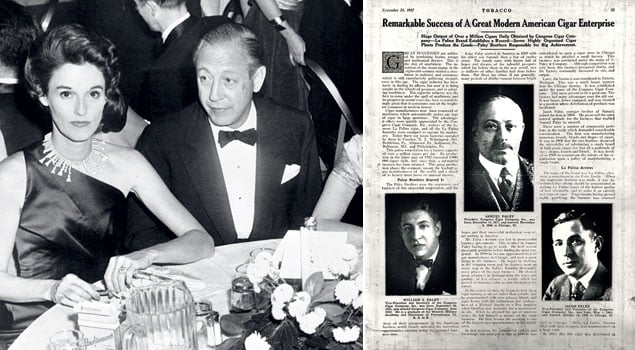
Frank Langella was wonderfully stern playing William S. Paley
in Good Night, and Good Luck, the George Clooney-directed movie
about Edward R. Murrow. And, as Babe Paley in Infamous—the biopic
that foolishly followed Philip Seymour Hoffman’s Oscar-winning title role
in Capote—Sigourney Weaver was long and lovely and almost always
seen with a Bakelite cigarette holder in hand.
So far, Bill Paley hasn’t turned up as a character in any
films. He did help make a movie, though. He was a production assistant on
A Talent for Loving, an independent Western comedy that lacked
both laughs and an audience.
Paley went to work on A Talent for Loving for three
months just after dropping out of Rollins College in Florida. “I did
dreadfully in school,” he says. “My cerebral and emotional development was
late. But then again, I was in the Army at 19.”
In 1968, he was drafted for service in Vietnam, but he enlisted
before being called up for duty so that he could secure an assignment
especially suited to his skills: motion-picture photographer for the Army.
He was stationed at Long Binh, the largest Army base in Vietnam. Half of
his time was in the field. The other half wasn’t.
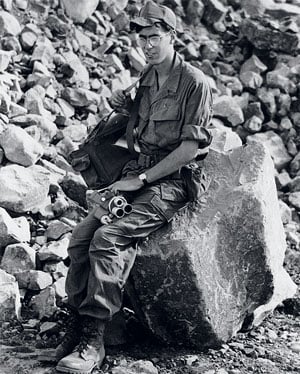
“I shot a lot of medal ceremonies and marches,” he says,
laughing. “As anyone will tell you, war is an extraordinarily boring time
interspersed with short periods of intense panic.”
In a 1977 Washington Post profile headlined a famous
father’s son lives out of the public ‘eye,’ Paley confessed that he had
dealt with both the boredom and the panic of war by indulging in heroin.
“I’d been a user since I was a teenager,” Paley says today, lowering his
already soft voice to a confessional level. On the movie shoot in Spain,
he’d gotten hooked on amphetamines. And before Vietnam, he also spent time
in Morocco, where, he said in the Post article, the hashish was
“lovely.”
William Paley, his father, was already looking for a successor
the year his son returned to the US. The elder Paley was 69, his son 21.
William didn’t control enough CBS stock to name just any successor he
wanted, much less a college dropout. CBS, after all, wasn’t a cigar store.
But he could have placed his son Bill in any number of jobs. Such as the
one Paley’s half-brother, Stanley Mortimer, had working with his
stepfather in a perfume business initially founded by Babe Paley. (In
addition to Bill and daughter Kate, William Paley had two adopted children
from his first marriage to Dorothy Hart Hearst and two stepchildren from
Babe Paley’s earlier marriage to Stanley Mortimer.) But Bill Paley wasn’t
interested in pursuing any of the paths his father could have laid out for
him.
“After Vietnam,” he says, “I wanted to take a break from
anything I had ever done before.”
Think about that for a moment: Paley had grown up in an
exclusive Long Island community. He had been to boarding school in
Switzerland. He had taken European vacations with his family, eating in
the temples of haute cuisine with his father. He wanted to take a break
from that? Or, knowing it was already too late to become heir of the CBS
chairman’s seat, did he really just want to run away and hide?
• • •
After he was discharged from the Army, Bill Paley put a gold
hoop in his left ear, grew his hair to shoulder length, and moved to Piney
Point, Maryland, on the Chesapeake Bay. He would spend the next half
decade on or near the water. In Piney Point, he restored a dilapidated
57-foot sailboat, then sailed it to Florida and traded it in for a 1930s
gaff-rig schooner. For three years, he sailed that boat around the Florida
Keys, working odd jobs when the schooner was docked.
“It was all about living a life that was free from
responsibility,” Paley says, flashing a smile that’s still toothpaste-ad
material. “It was marvelous.”
His father didn’t agree—and Bill Paley knew it. So in 1975,
right after CBS: Reflections in a Bloodshot Eye painted him as a
ne’er-do-well, Paley decided to do something that might make his father
happy. He used his trust-fund money and, with a few partners, opened three
restaurants and bars in Washington and Baltimore: “I got in the restaurant
business because I loved food but also to please my father, who was a
great epicurean.”
In DC’s Adams Morgan, in the space now occupied by Perrys,
Paley had the Biltmore Ballroom. In Baltimore, he and his partners
established the Brass Elephant, an eatery that would outlast Paley’s
ownership by decades, closing only three years ago. And on Capitol Hill,
Paley created the Gandy Dancer, a spot that Washington Dossier, a
now-defunct society magazine, praised for its Fruit Fantasia and Hamburger
l’Elegante and for its unique mix of clientele—Hill staffers and theater
types. The magazine also asked, “Doesn’t it give you a warm feeling in
your tummy to know that Babe Paley’s son has a piece of the
action?”
Babe Paley’s son not only had a piece of the action; he was at
the center of it. “Bill always had a lot of attractive women around him in
the place, and he was a real gladhander,” recalls Keith Stroup, legal
counsel and founder of the National Organization for the Reform of
Marijuana Laws, who was a friend of Paley’s in the mid-1970s and a regular
at the bar. “If you were in Washington and politically active in the ’70s,
the Gandy Dancer was the place to be.”
The book High in America, which chronicles NORML’s
early years, says plenty of influence-peddling went on in the bar. “The
Gandy Dancer was the in spot for Washington’s younger political crowd,
much as Duke Ziebert’s restaurant had been for the older political
generation,” wrote author Patrick Anderson.
Duke’s was in business 44 years; the Gandy Dancer didn’t make
it to four. Paley and partners kept a tab open for NORML, which Stroup
says often went unpaid, and artists were given food and drinks in exchange
for art at the Biltmore Ballroom.
You could blame Paley’s drug use for the collapse of the
business, but he doesn’t: “I was in my twenties. I had no idea what I was
doing.”
• • •
Paley’s father, William, dropped by the Gandy Dancer just once.
After a night out with Henry Kissinger and with his limousine waiting out
front, the founder of CBS entered through a lower-level door, peered into
the dining room from the kitchen, ordered an egg-salad sandwich and onion
soup, and took the food away in a doggie bag. He later said he was
impressed with the place. But his son today doesn’t think his restaurants
truly pleased his father.
Then again, trying to please William Paley may have been
impossible. In her biography of him, In All His Glory, Sally
Bedell Smith paints the elder Paley as a “hard-driving” narcissist who
“treated his children much as he dealt with his top executives. . . . What
counted was that they knew he was in charge.”
Actually, his executives probably saw Paley more often. For
much of the year, William lived in Manhattan during the week and saw Bill
and his sister, Kate, in Manhasset only on weekends. But there were also
family trips to the Bahamas, Jamaica, and Europe. In Europe, Bill and his
father bonded over the pleasures of a gourmet meal. William Paley aspired
to live “the good life,” surrounding himself with beautiful things and
people. Smith titled an entire section of her book “The
Hedonist.”
On that subject, it’s like father, like son. Bill Paley markets
La Palina cigars as high-quality products that adhere to tradition and
enhance the good life. He tells stories of how his father lived that life
and how his mother embodied it. Lately, he’s been telling his own story,
too.
Paley is increasingly the public face of La Palina. He has even
started to appear in its ads. The bearded, white-haired Paley is now
selling himself as sort of a Dos Equis Guy for stogies. And what’s really
interesting about this cigar-smoking version of the Most Interesting Man
in the World is that he’s an ex-addict who is selling vice.
Proudly.
“When the time came to let go of everything else,” Paley says,
“I picked my favorite drug—tobacco—and decided to become an expert in
that.”
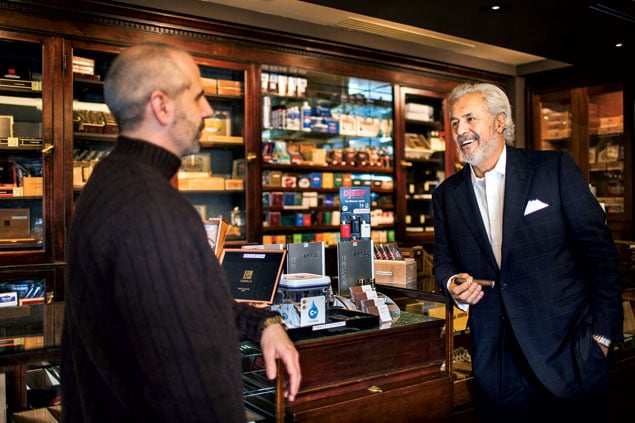
Last May, dressed in a navy suit with a crisp white
open-collared shirt and a cigar in hand, Bill Paley stood in a park in
midtown Manhattan and proclaimed that the park “is going to continue to be
a place that will be an oasis for people to exercise their
freedom.”
It was the second annual Legal Outdoor Smoke, an event that
jabs at New York City mayor Michael Bloomberg’s regulations against
smoking in public. Because the property where the event is held—Paley
Park, on the site once occupied by the legendary celebrity hangout the
Stork Club—is a private park funded by the William S. Paley Foundation,
Bloomberg can’t stop this smoke-in.
That’s about the extent of Bill Paley’s public politics,
though. He and his wife, Alison—whose late father, Albert Van Metre,
founded Van Metre Homes, a company that has built more than 15,000 homes
in Washington since the 1950s—don’t hold $1,000-a-plate fundraisers at
their 8,800-square-foot mansion in McLean. Paley typically eschews Capitol
Hill and Georgetown glitterati, preferring to befriend entrepreneurs,
artists, and gallery owners.
But he does take a very inside-the-Beltway approach when it
comes to cigars.
“One of the causes of the discord and vitriol that is happening
in politics nowadays stems from the very day they made it illegal to smoke
in the Capitol,” Paley says. “The term ‘smoke-filled room’ really does
have important historical meaning. That’s where things got worked out,
when, after sessions in Congress, politicians used to gather, smoke
cigars, and talk. I think there is something in the nature of tobacco that
makes this possible. The American Indians understood this. Whenever there
was something important they had to do, the first thing they did was smoke
some tobacco, because it opened up people’s minds and allowed them the
patience to listen.”
One thing Paley has no patience for, though, is comparisons
between cigars and cigarettes. He knows firsthand the damage cigarettes
can do: His mother, a smoker, died from lung cancer in 1978 at age
63.
“The tobacco is changed for cigarettes so that you have to
inhale it,” Paley says, fidgeting in his leather chair, his voice raised
for the first time in a 90-minute conversation. “It does not absorb in the
mouth like a cigar does. It goes to the lungs, and the lungs go directly
to the brain. It is the fastest delivery system you can have with a drug.
Faster than an injection. It impacts the brain so powerfully that the
neurochemicals change in response and it creates an
addiction.”
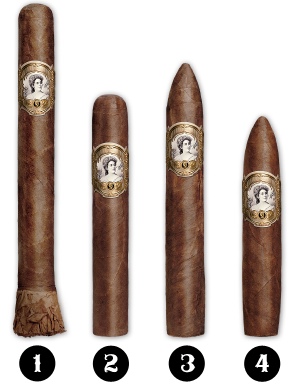
1. The Pasha
Named for: William S. Paley
Critics say: “Flavors of earth and roasted cashews with a hint of brown sugar.”
2. The Babe
Named for: Babe Paley
Critics say: “A medium-bodied cigar with full-on flavor and complexity.”
3. The Alison
Named for: Paley’s wife
Critics say: “Came out kicking . . . then offer[ed] a more floral bouquet.”
4. The Little Bill
Named for: Paley himself
Critics say: “Pairs well with cognac . . . Burn was smooth with a firm draw.”
He goes on for a while, discussing the addictive qualities of
all kinds of substances, including sugar and white flour. It’s an
impressive soliloquy, one that has been informed by years of
study.
When Bill Paley’s first son, Sam, was born in 1984, he decided
it was time to get sober. During his recovery, he poured himself into a
single subject: the nature of addiction. By 1990, he had made a full-time
career of it. Paley got licensed as an addiction counselor and began
working with wealthy addicts and their families.
He was describing his new calling to his father over lunch one
afternoon in the late 1980s. William Paley’s eyesight and mental faculties
were failing. His short-term memory was particularly bad. Bill told his
father he had gotten his counseling license and wanted to help people beat
addictions. His father said, ‘You know, you should meet my son Bill. You’d
be a really good influence on him.’ ”
Bill Paley clutches his heart as he recounts the story. You
might think he’s pained by the memory, upset that in his final days his
father would never know that the son who had caused him so much dismay had
gotten his life together. But he’s actually overjoyed. Paley believes he
had changed so much that his father saw him as a completely different, and
completely respectable, person.
“My father always thought that I was a hippie and a drug addict
and a failure and someone he couldn’t relate to,” Paley says. “But that
day, he was thinking something about me that was so
different.”
• • •
It was Cuba that did it. A trip to the embargoed island nation
and its cigar factories in the early 1990s fascinated Paley and hooked him
on cigars.
Even so, nearly 20 years passed before he decided to get into
the business. You can hardly blame him—cigars are a low-margin, high-risk
business. Three manufacturers control more than half of the US market. The
other half is split among dozens of companies, most of them tiny. That
adds up to consumer confusion. Walk into any cigar store and you’ll be
confronted with thousands of choices. And price won’t be your guide. A $6
cigar can be as good as or better than a $26 cigar. Blogs and magazines
can help, as can a good salesperson. But that means small cigar
manufacturers have to work hard to make their products stand
out.
All of which is why Bill Paley’s family story—and his family
fortune—was crucial to La Palina’s revival. “Bill had the money to
advertise and promote his cigars,” says Draper’s Matt Krimm. “A lot of
manufacturers can’t afford that when they first start out.”
A lot of manufacturers also might not get the initial acclaim
that La Palina received. The cigars have been widely praised by reviewers.
In fact, one of La Palina’s new releases—the Kill Bill, named not for the
movie but for the fact that the cigar, before it had had time to mellow,
was too strong for Bill Paley to finish in one sitting—was given a 93 out
of 100 by Cigar Aficionado. That makes it “outstanding” in the
magazine’s rating system and also placed it as one of the highest-rated
cigars last year.
For Paley, that positive reception is more important than
financial results—an attitude he says he gets from his father: “My father
saw very early that in the media business quality content is the most
important thing. He went out to secure the best entertainers and secure
the best content. That would get more people watching and listening, and
that would allow him to sell his advertising better. I follow that same
plan: I put content first, and success will follow.”
For now, though, not a lot of money has followed. Paley isn’t
certain of the numbers, but La Palina has sold a little more than 40,000
cigars in the past two years. That makes it a very small player. More than
13 billion cigars were purchased in the US in 2010, according to the
Centers for Disease Control and Prevention.
Paley gets his tobacco from growers in Honduras, Ecuador,
Nicaragua, Brazil, the Dominican Republic, and Costa Rica, and he works
with several factories to assemble them, including in the Bahamas,
Honduras, and Miami. Some of his cigars command $22 or more. Others, like
the recently released La Palina Classic line, are priced in the sweet spot
for cigar purchases—between $6 and $8. All, Paley says, have sold well.
But do the back-of-the-envelope math and you get gross revenues of less
than $1 million over the past two years.
Meanwhile, Paley says he has spent about that amount on the
company to date: “I could have sailed around the world for the amount of
money I’ve spent on this business. But I wouldn’t have enjoyed it as
much.
“Not to be grandiose, but I feel like this is what I should be
doing. Every fiber of my being tells me that this is the best thing I
could be doing at this point in my life.”
• • •
Maybe, if he succeeds, Bill Paley can finally make his father
happy.
“My father was a very powerful man,” he says, “and I always had
a feeling that I had to live up to certain expectations. I’m sure that was
all just in my head—well, probably it was all in my head. But somehow with
La Palina I feel like I’m at least pleasing my grandfather. And in that
way, I hope I’m pleasing my father, too.”
He’ll never know for sure, of course. But Paley does know that
his foray into the cigar business has made his own sons happy. He started
just after both boys had moved away from home. Paley’s younger son,
Albert, 25, is now studying at the University of the District of Columbia.
His older son, Sam, 28, is a video-game developer who founded a Boston
company called Lantana Games.
“They have brains that are like mine—very attention deficit
disorder,” Paley says. “So I gave them a lot of space to learn a lot of
things and see what stuck.”
The boys gave him something, too. Years of free therapy.
Raising sons helped Paley work out many of the issues he had with his
father.
“I remember years ago my son Sam had done something that I
thought was stupid,” Paley says. “I don’t even remember what it was. I
started yelling at him. Then I stopped myself. I thought, ‘What am I doing
yelling? What am I trying to say?’ I realized I was trying to say, ‘I care
about you. I love you.’ And right then I realized that was what my father
was really trying to say for all those years, too: ‘I love you.’ ”
This article appears in the February 2013 issue of The Washingtonian.

